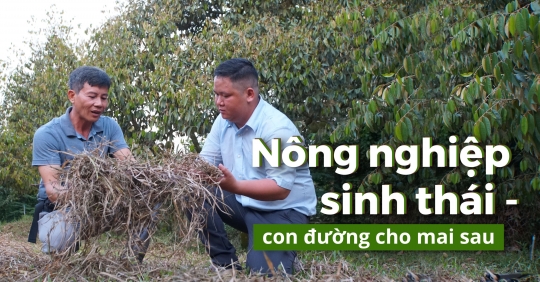Don’t destroy weeds, plant more
Farmers have long viewed weeds as enemies, just like insects that destroy crops. You will find all sorts of ways to clean the grass, even eradicate it with herbicides or till the soil. They fear weeds will compete with plants for light and nutrients. Therefore, weed control has the highest priority.
However, some gardeners in Tay Ninh province are doing the opposite, leaving the grass in the garden to save costs and encourage sustainable agriculture. This approach is considered in terms of safety and sustainability and is a new trend in modern agriculture.
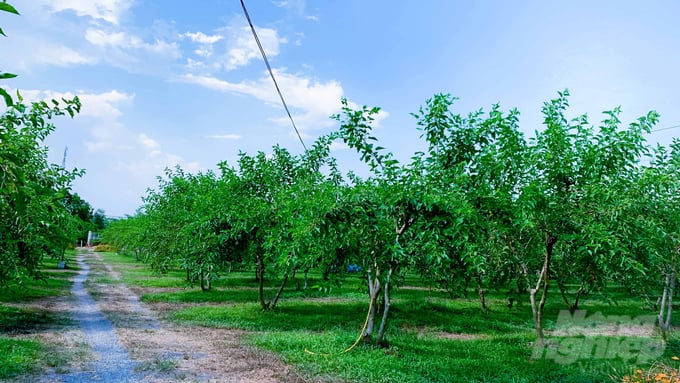
Although he doesn’t use much fertilizer, Mr. Vu’s mulberry garden is always green because the grass underneath stores nutrients and encourages the growth of microorganisms in the soil. Picture: Tran Trung.
More than 1,000 roots mulberry orchard of Mr. Nguyen Thanh Vu’s family (Ba Phong mulberry orchard, Tan Loi hamlet, Tan Hung township, Tan Chau district, Tay Ninh province) has an area of 2 hectares, where fruit is continuously harvested in the beginning 2023. A natural grass grows under the mulberry trees. Mr. Vu not only finds a way to kill weeds, but also plans to grow more grass and vegetables.
“When the grass gets old, I cut it off to the top and leave it in place. The flowers of the grass make the seedlings grow directly, the grass is also a source of organic fertilizer to return nutrients to the soil. “In this way, I can save on production costs without losing anything, but the country also reaps many benefits,” Thanh Vu said.
Many years ago it was common for grass to grow in the orchard. But later, thinking that weeds would compete with plants for light and nutrients, gardeners killed the weeds by any means necessary. The most threatening is the overuse of herbicides, which causes great damage to the environment and the quality of agricultural products. Unlike many plants, the grass is not planted, but grows abundantly. The more it is destroyed, the stronger it grows.
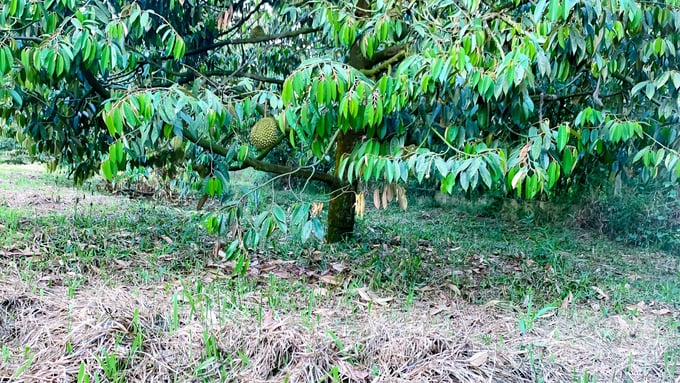
Today, many organic farms only use weed cutting to control and control, not eradicate. Picture: Le Binh.
Lush grass grows under durian roots at Huynh Quoi Durian Farm (Som Suoi Hamlet, Hung Thuan Township, Trang Bang District, Tay Ninh Province). Weeds help Huynh Quoi limit watering even in the dry season. At the same time, weeds also resist erosion. The roots help the soil become more porous, creating conditions for microorganisms to penetrate and work in the soil. For many years, Mr. Quoi has always considered Gras as a close friend in the management of agricultural land.
He shared: “When fertilizing, the wild cabbage garden retains moisture, avoids direct sunlight and rain, and helps the soil become more porous, limiting fertilizer loss. At the same time, when cutting, weeds are also very important organic substances that help return nutrients to the soil, make the garden ecosystem sustainable and attract natural enemies. Therefore, weed care will limit the use of pesticides in gardens if we know how to properly care for weeds and use weeds appropriately to balance the ecosystem in the garden.
Weeds – a key element in organic farming
In fact, his father has known that grass is a friend for thousands of years. Looking back at the agricultural habits of growing wet rice, the ancestors knew how to “eat” very well with the grasses in the field. Weeds are not only harmless to the plant, but also to the vegetation, which retains moisture and nourishes the microorganisms that make the soil long-lasting.
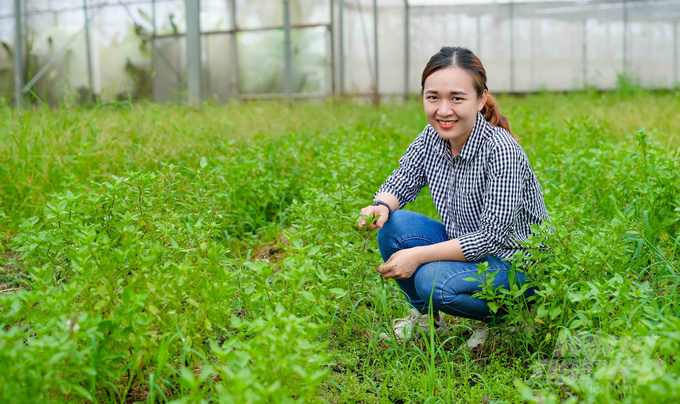
Overgrown grass is intertwined in the vegetable beds. As a result, the plant does not “compete” for nutrients, but on the contrary helps to concentrate more nutrients on the tree. Picture: Le Binh.
dr Tran Dinh Ly, Vice Rector of the University of Agriculture and Forestry in Ho Chi Minh City, quoted: “In the past, weeding was used to make room for plants. Only plants that grow on the same soil eat grass, like rice, and.’ Then rake up the grass and bury it well. Land.
“The grass is still well tended and always regenerating, so the cattle have something to eat, the land doesn’t erode and there’s fresh country air. And remember, most weeds are medicines, thanks to them people and livestock are resistant to diseases, they are a boon in the field. His father didn’t see weeds as enemies, but as friends,” said Dr. Tran Dinh Ly.
Japan – a country that respects natural agricultural philosophies. And of course, for them, weed care is also an integral part of their farming habits.
Masanobu Fukuoka (1914-2008) was a soil scientist – the ancestor of Japanese agriculture. He said that as people try to control disease by any means, they gradually move away from nature. This is useless and at the same time destroys everything. For Masanobu Fukuoka, farming means no weeds, no pesticides, no plowing, no fertilizers.
After many years of working in Japan, Assoc. Prof. TS.BS Nguyen Thi Bay – Chairman of the Ho Chi Minh City Association for Oriental and Western Medicine – quite impressed with the agricultural habits and philosophy of the Japanese.
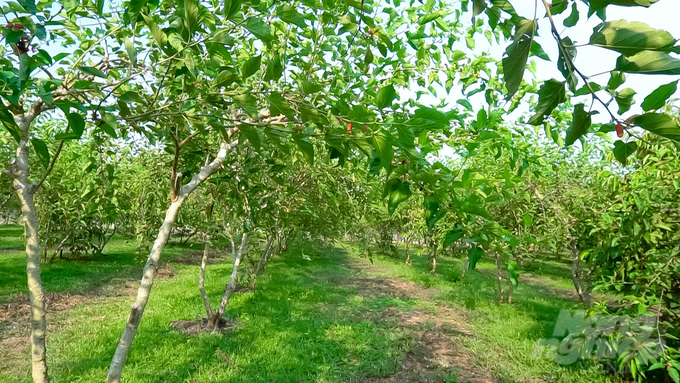
Today’s farmers have increasingly recognized the great benefits of weeds and regard weeds as friends rather than enemies, as was previously misunderstood. Picture: Le Binh.
“The Japanese believe that home-grown vegetables must be absolutely clean and eaten directly without washing. Vegetables grown with weed are not only delicious, but also a natural medicine to cure diseases.
And for those who, like us, work in medicine, especially in oriental medicine, in the weed there are always countless medicines with a high medicinal herb content. In Vietnam, most medicinal plants in the book “Hai Thuong Y Tong’s Heart of the Heart” by the famous doctor Le Huu Trac or “The Magic Southern Medicine” by the famous doctor Tue Tinh…also weeds and vegetables in the garden. “, Associate Professor. TS.BS Nguyen Thi Bay shared.
Ehrenfried E. Pfeiffer (1899 – 1961) is a German scientist specializing in soil science who expressed his opinion in the book “Weeds and the Unknown” as follows: “Weeds are considered to be organisms. According to human subjectivity, they are harmful because they grow in places where they don’t grow desired by humans. In orchards where weeds are present, they are resistant to adverse conditions to which the plant is not resistant.
“They are witnesses to man’s failure to rule the land, and they grow in abundance in the places we have missed, helping us to see our mistakes and nature’s remedy.” nature teaches. Overcome mistakes and sometimes they seem to mock humanity,” he wrote.
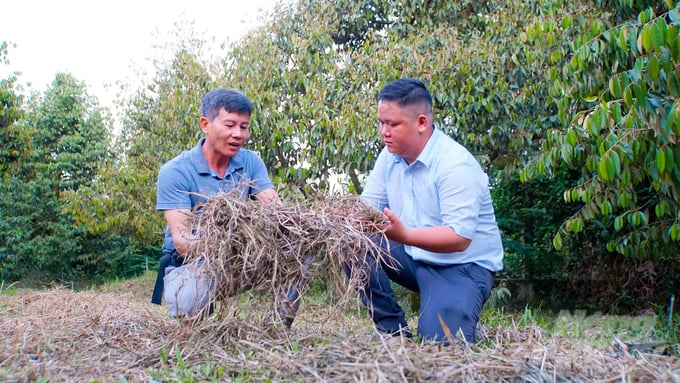
The turf at Huynh Quoi durian farm has just been cut to prepare for the coming rainy season. Picture: Tran Trung.
According to the principles of soil science, weeds protect the microorganisms in the soil during the dry season and keep the moisture for the plants. When fertilizing, the grass acts as a “fence” to hold back the amount of fertilizer and prevent losses. In the rainy season, weeds help farmers fight soil erosion. As they grow, the weeds are cut by the gardeners and composted on the stumps to produce organic fertilizer and thus create a useful layer of topsoil for the plants.
dr Tran Dinh Ly, vice president of Ho Chi Minh City University of Agriculture and Forestry, said productivity makes farmers shy when choosing the organic farming path. The most effective solution to organic farming is to improve, restore and boost soil nutrients. Weed is the key factor of this solution.
“Fertilizing the soil with weed mulch, cover manure … helps restore the environment and microbial ecosystem, returns the soil’s inherent nutrients, gives the soil time to rest so that the soil can balance and maintain and the necessary amount of nutrients regenerates.” in addition to pest and disease control measures to increase the yield of each crop,” said Dr. Tran Dinh Ly.
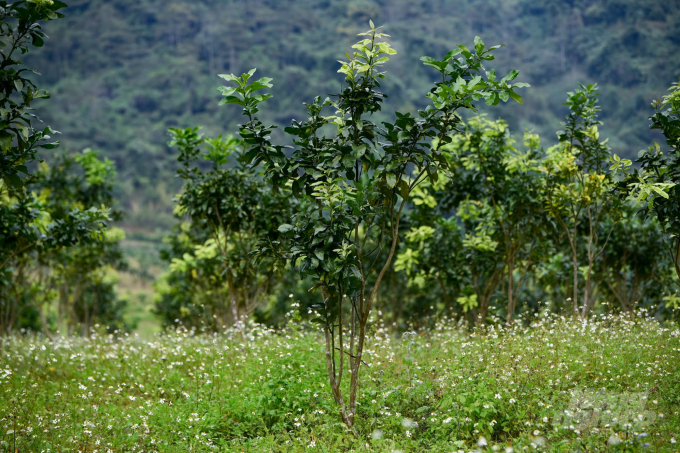
Currently, many models of organic farming, moving towards organic, consider weeds as one of the key factors in production. Picture: Din Tung.
Weeds must be controlled properly
To get the most out of weeds, according to Dr. Tran Van Thinh, associate professor of agronomy at the University of Agriculture and Forestry in Ho Chi Minh City, adequate weed control measures required:
– Say no to herbicides in the garden. If you want to get rid of unwanted weeds in the garden, you can do it manually, spreading the stump as compost and planting other plants.
– Prioritize native weeds and grass species that grow naturally in the garden. Cover crop cultivation with legumes, chrysanthemums or grasses to obtain biomass to increase biological nitrogen for the soil, improve the soil, limit soil nematodes and produce animal feed.
– The grass should be mowed when the flowers and seeds have withered. Cut the grass about 10 to 15 cm from the root. Simply cut the grass two or three times during the rainy season.

